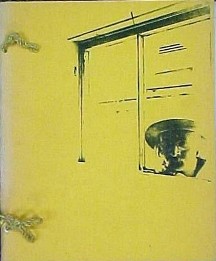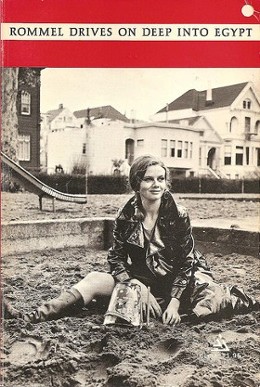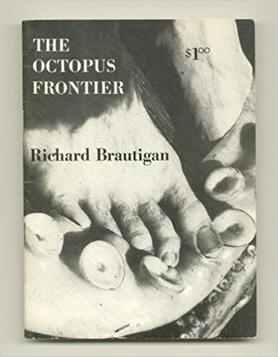
Richard Gary Brautigan was an American novelist, poet, and short story writer. A prolific writer, he wrote throughout his life and published ten novels, two collections of short stories, and four books of poetry. Brautigan's work has been published both in the United States and internationally throughout Europe, Japan, and China. He is best known for his novels Trout Fishing in America (1967), In Watermelon Sugar (1968), and The Abortion: An Historical Romance 1966 (1971).

Springhill is a community located in central Cumberland County, Nova Scotia, Canada.

Joanne Kyger was an American poet. The author of over 30 books of poetry and prose, Kyger was associated with the poets of the San Francisco Renaissance, the Beat Generation, Black Mountain, and the New York School.

Springhill mining disaster may refer to any of three deadly Canadian mining disasters that occurred in 1891, 1956, and 1958 in different mines within the Springhill coalfield, near the town of Springhill in Cumberland County, Nova Scotia. In the 1891 accident, 125 died; in 1956, 39 were killed; and in 1958, there were 75 miners killed.

Trout Fishing in America (1967) is a novella written by Richard Brautigan. It consists of short pieces linked by recurring characters.

Poetry has been published in Chicago since 1912. It is one of the leading monthly poetry journals in the English-speaking world. Founded by poet and arts columnist Harriet Monroe, who built it into an influential publication, it is now published by the Poetry Foundation. In 2007 the magazine had a circulation of 30,000, and printed 300 poems per year out of approximately 100,000 submissions. It is sometimes referred to as Poetry—Chicago.
Barry Miles is an English author known for his participation in and writing on the subjects of the 1960s London underground and counterculture. He is the author of numerous books and his work has also regularly appeared in leftist newspapers such as The Guardian. In the 1960s, he was co-owner of the Indica Gallery and helped start the independent newspaper International Times.

All Watched Over by Machines of Loving Grace is Richard Brautigan's fifth poetry publication. Like several of his early works, the entire edition was distributed for free. The title poem envisions a world where cybernetics has advanced to a stage where it allows a return to the balance of nature and an elimination of the need for human labor. All thirty-two of the poems in this collection were republished in The Pill Versus the Springhill Mine Disaster.
Ronald William Loewinsohn was an American poet and novelist who was associated with the poetry of the San Francisco Renaissance since his inclusion in Donald Allen's 1960 poetry anthology, The New American Poetry 1945–1960. He was Professor Emeritus of English at the University of California, Berkeley.

Rommel Drives on Deep into Egypt is Richard Brautigan's eighth poetry publication and includes 58 poems. The title of the book echoes a 1942 San Francisco Chronicle headline describing a successful operation by Rommel during the North African Campaign of World War II. The six line title poem, reminiscent of Ozymandias, uses this headline to examine the transitory nature of both human endeavor and the reader of the poem. The photograph on the cover of the first edition is of model Beverly Allen and was taken by Edmund Shea in Golden Gate Park, San Francisco.

Please Plant This Book is the sixth volume of poetry published by American writer Richard Brautigan. The collection consists of a glued folder containing eight seed packets, with a poem printed on the front of each. The book was Brautigan's last self-publishing venture. The edition had a run of 6,000 free copies. The entire edition was offered for free distribution; permission to reprint the collection was explicitly granted, as long as the new printing was also offered free of charge. Although a relatively large edition for an early Brautigan work, it is now considered a rarity.

The Galilee Hitch-Hiker is Richard Brautigan's second poetry publication. It was first published in 1958 by White Rabbit Press in a hand-sewn edition of 200, and was sold by a variety of means, including City Lights Bookstore and direct sales by Brautigan to those passing by on the street.
In 1966 the book was re-released by The Cranium Press in a run of 700 with an additional 16 signed and numbered copies. Brautigan signed each of the 16 copies in blue pencil and drew a small picture of a fish.

Loading Mercury with a Pitchfork is Richard Brautigan's ninth poetry publication. Published in 1976, the book includes 127 poems. The four line title poem discusses the effort and interest in undertaking an obviously impossible task, such as loading the liquid metal Mercury using only a pitchfork.
Edmund Shea was an American photographer based in San Francisco.
"All Watched Over by Machines of Loving Grace" is a poem by Richard Brautigan first published in his 1967 collection of the same name, his fifth book of poetry. It presents an enthusiastic description of a technological utopia in which machines improve and protect the lives of humans. The poem has counterculture and hippie themes, influenced by Cold War-era technology. It has been interpreted both as utopian and as an ironic critique of the utopia it describes. It is Brautigan's most frequently reprinted poem.
This is a list of publications by Richard Brautigan (1935-1984), an American writer known for his poetry, novels, and short stories.

June 30th, June 30th is a poetry collection published in 1978 by American writer Richard Brautigan. It was his eighth book of poetry and the last released in his lifetime. It contains 77 poems that Brautigan wrote in 1976 during his seven-week stay in Japan, presented in a diary-like format. The title is the date he planned to leave the country.

The Octopus Frontier is a 1960 poetry collection by American writer Richard Brautigan. It is Brautigan's fourth poetry publication and his second collection of poetry, and it includes 22 poems.

Lay the Marble Tea is a 1959 poetry collection by American writer Richard Brautigan. It is Brautigan's first collection and third poetry publication.

The Return of the Rivers is the first work of poetry released by American writer Richard Brautigan. It was first published in 1957 by Inferno Press. Several of Brautigan's poems had been published as early as 1952, when "The Light" appeared in the Eugene High School News, but The Return of the Rivers was the first formally published on its own. It is a single two-part poem printed on a broadside, wrapped in construction paper, and fitted with a label that had the name of the printer and Brautigan's signature. It was reprinted in the Berkeley Review, also in 1957, and was included in Brautigan's best known collection, The Pill Versus the Springhill Mine Disaster. Caroline Bokinsky called the poem "an observation of the external world as a surreal, romanticized setting in which the cycle of life is exemplified in the river, sea, rain, and ocean."














